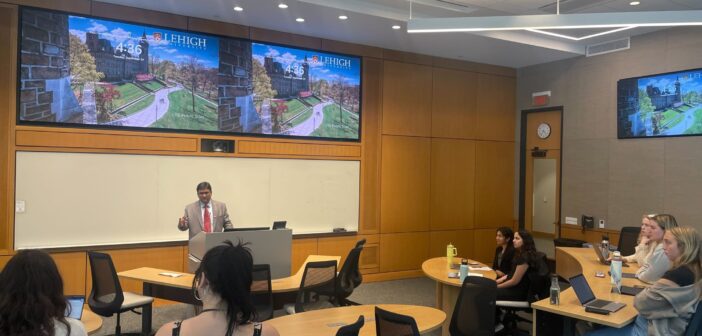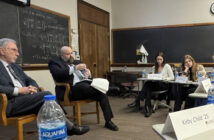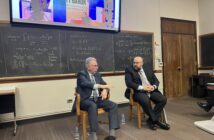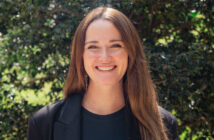Binod Anand, secretary general of the Confederation of NGOs of Rural India, gave a keynote address to students in the Business Innovation Building on Tuesday evening. The event was organized as part of the 20th anniversary celebration of the Lehigh University/United Nations Partnership.
Anand co-founded the Centre for Agricultural Transformation, a nonprofit organization dedicated to policy formulation and sustainability through research and innovation.
He discussed the role of youth in the field of STEM, initiatives in combating climate change and improving sustainability across the globe.
Anand also addressed the human necessity for sustainable development — not just bombarding students with facts and statistics.
“It has to be politically acceptable, and that doesn’t mean (just for) the Democrat(s) and Republicans,” Anand said. “Politically acceptable means the collective needs to accept it. The big mass needs to accept it, and if it is good for everyone, then that policy is okay.”
Diya Narayan, ‘27, attended the event and said she’s a marketing major who is passionate about environmental issues and efforts to increase sustainability.
Narayan said she could relate to Anand’s stories about growing up in India because she recently traveled there.
“I attend a lot of UN conferences, and they’re always saying what youth can do,” Narayan said. “I think that the UN has been moving toward less governmental issues, and it’s more about what the youth can do because we’re the next generation.”
Elena Reiss, manager of Lehigh’s UN youth representative program, was also in the audience and said she knew Anand would be an insightful speaker after meeting him at the Civil Society Town Hall with the president of the General Assembly.
“Anand was presenting alongside one of the LU/UN youth representatives and got engaged in a conversation,” Reiss said. “I was curious who that person was. When he was delivering his speech, it was only a few minutes, but it was very much focused on the importance of STEM and STEM research. So we thought that aligned perfectly with Lehigh’s mission.”
At Tuesday’s keynote address, she said she was impressed with the engagement between Anand and the students. She was pleased that the youth representatives put a name to the face of one of their NGO partners.
“It’s important that (Anand’s) youth representatives meet him in person and get to know him (and) understand the mission of his organization better.” Reiss said.“We were also able to define some goals for the next year with the current youth reps. It was a very productive day.”
Anand included statistics and calls for action in his speech, showing the level of urgency he believes is necessary to slow the rate of climate change. He said since the Addis Ababa conference in 2001, only 17% of the Sustainable Development Goals have been achieved.
He also outlined how he believes large-scale global problems should be met with solutions that are economically viable, sustainable, executable and politically feasible for the whole world — particularly the global South.
“So if it is not executable to the global South, it is not executable to the part of the globe which requires it,” Anand said.
After his keynote address, Anand held a Q&A session for attendees, one of whom asked him what strategies he found to be the most effective in engaging youth in STEM initiatives and rural communities.
Anand said everyone wants the voice of the youth to be captured, but when it comes to “real action” poses a challenge — this generation.
He said the reliance on the internet limits youth from finding their voice in the world.
“You can Google everything to find answers, which is a good thing but also a bad thing because you need to be able to speak your mind, to raise and create your own voice,” Anand said. “It’s in your hands.”
Sameen Basha, ‘26, one of the youth representatives for the Confederation of NGOs of rural India, delivered the vote of thanks at the event.
She said through the UN Youth Representative Program, students apply to an NGO of their choosing and are then selected from a pool of applicants to be a voice for them.
Basha said it was intriguing to hear from Anand about the impact of having dialogue with the youth, especially relating to policy reform and social change happening in the world.
She said these topics are important because future generations will be impacted by what individuals do today.
“The conversations we have with each other and with the people that we meet along the way is what is going to end up making that vital change, especially when it comes to sustainability in the world that we want to live in — the world that we’re going to live in for the rest of our lives,” Basha said.
Anand said as he makes the trip back home to India, he’ll reflect on the time he spent with students during his visit. He said it was a learning experience for him to hear everyone’s questions and interact with the Lehigh community.
“So let us join hands,” Anand said. “We are sitting here. Our representatives are here. Work on those policies. Create something like UN 2.0, which is youth-related, and you will be proud of that after 20 years.”






Comment policy
Comments posted to The Brown and White website are reviewed by a moderator before being approved. Incendiary speech or harassing language, including comments targeted at individuals, may be deemed unacceptable and not published. Spam and other soliciting will also be declined.
The Brown and White also reserves the right to not publish entirely anonymous comments.